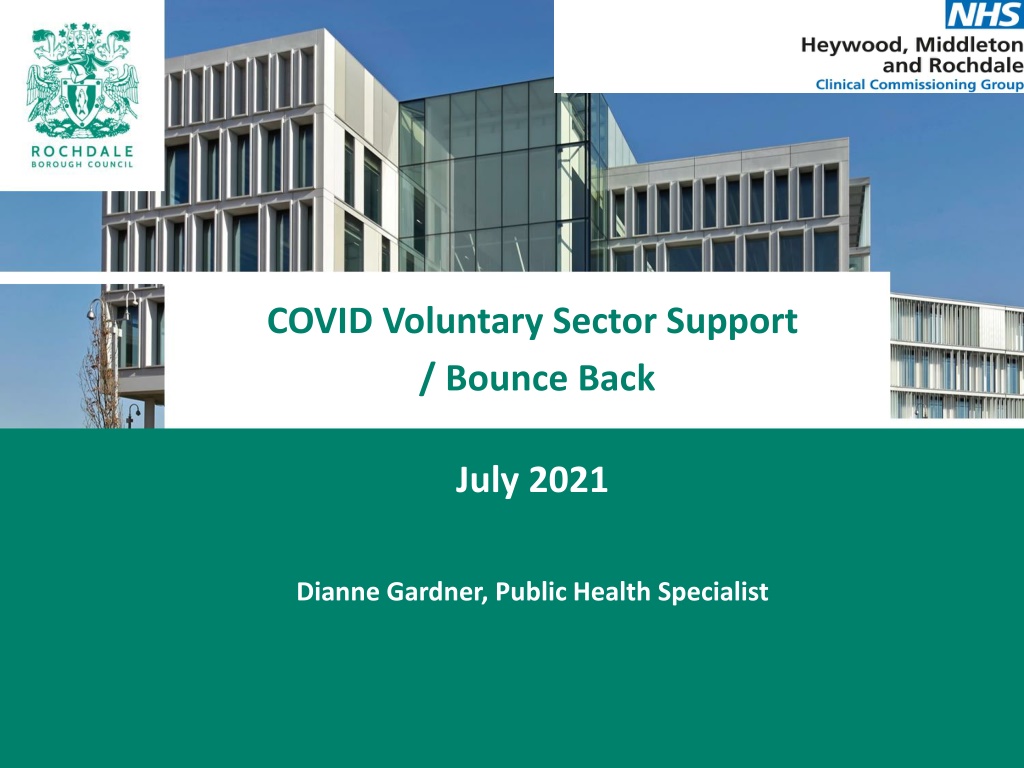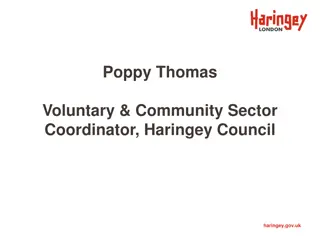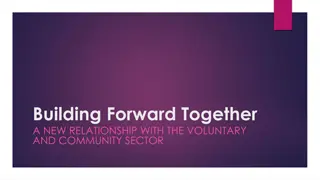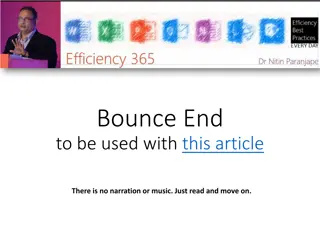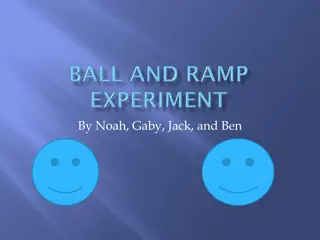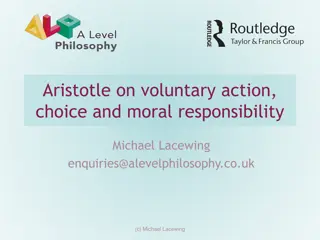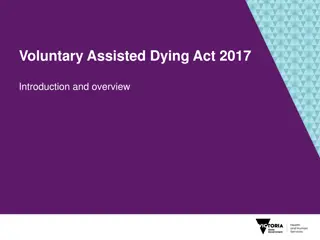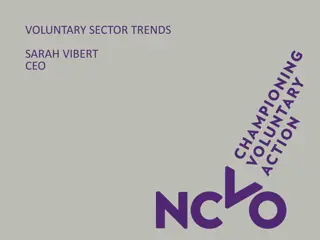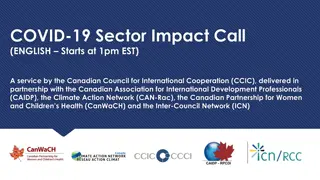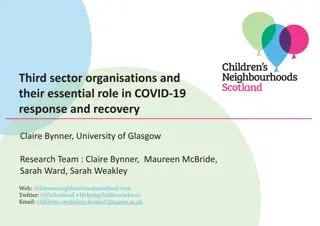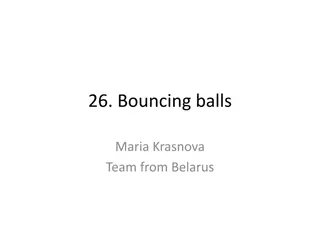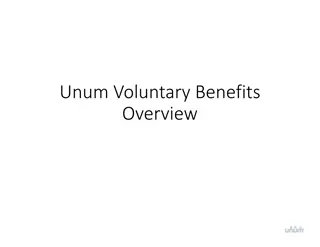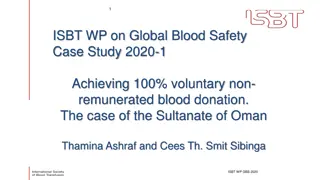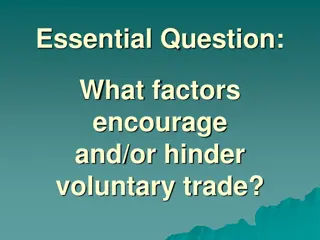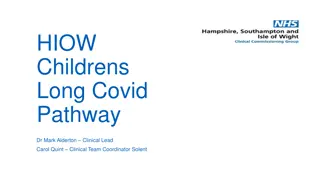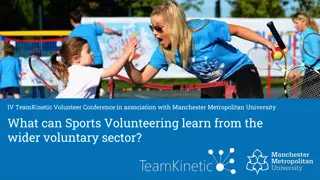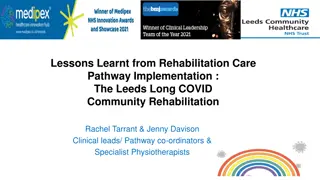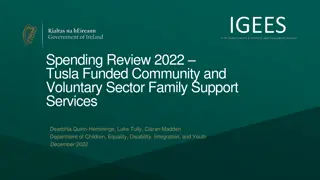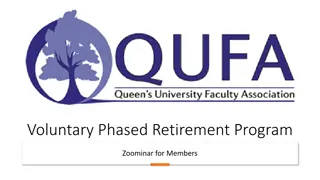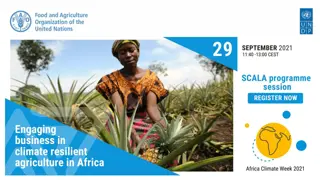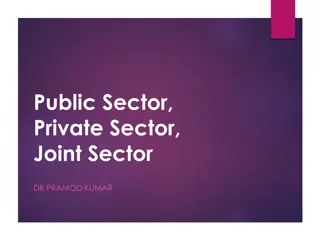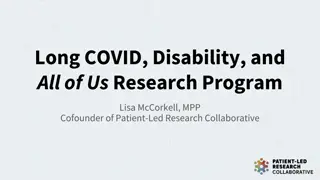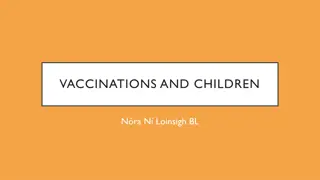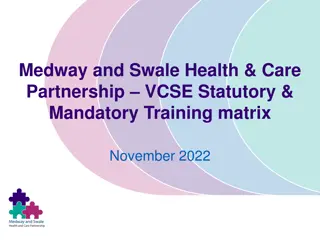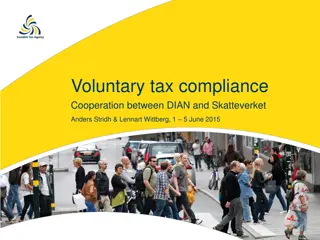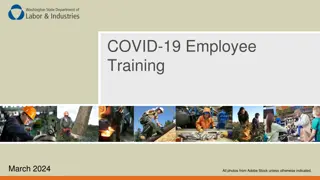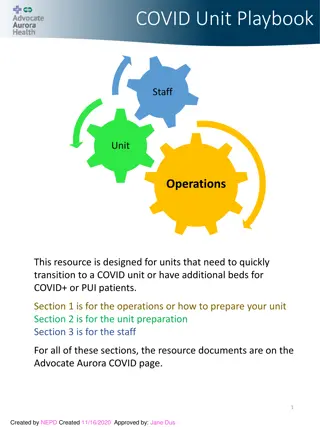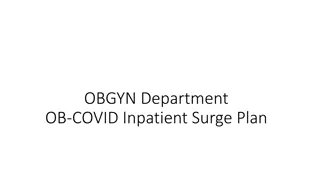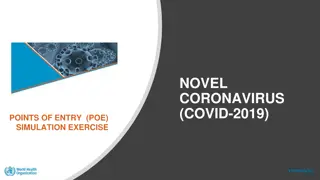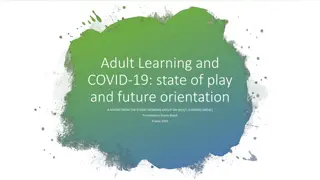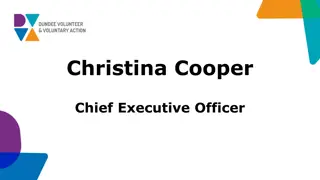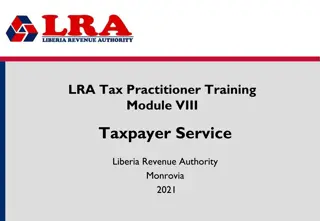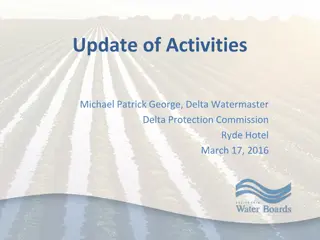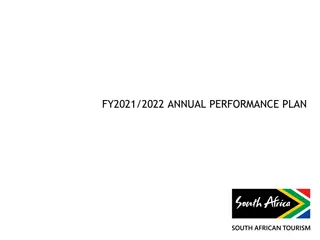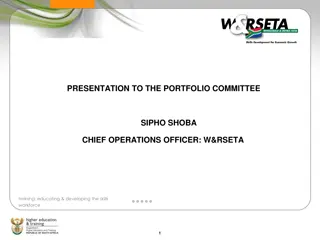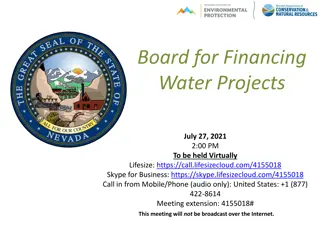Supporting COVID Voluntary Sector: Bounce Back Program July 2021
Dianne Gardner, a Public Health Specialist, leads initiatives supporting Clinically Extremely Vulnerable (CEV) individuals and mental health funding programs. The Bounce Back Programme aims to address various challenges faced during the pandemic with innovative solutions and community grants.
Download Presentation

Please find below an Image/Link to download the presentation.
The content on the website is provided AS IS for your information and personal use only. It may not be sold, licensed, or shared on other websites without obtaining consent from the author. Download presentation by click this link. If you encounter any issues during the download, it is possible that the publisher has removed the file from their server.
E N D
Presentation Transcript
COVID Voluntary Sector Support / Bounce Back July 2021 Dianne Gardner, Public Health Specialist
Clinically Extremely Vulnerable (CEV) and PHE Better Mental Health Funding TO DATE Clinically Extremely Vulnerable Total received to support our 14,500 shielding residents during 2021 March 22 = 672k Spent approximately half to date including: - CEV communication - Community hubs - COVID Helpline - Living well chatters - Digitech library - Council food hub / Community warehouse - Community response fund PHE Better Mental Health Funding This fund forms part of the government s Mental Health Recovery Action Plan 2021/22 to ensure the mental health impacts of COVID-19 are rapidly addressed. Funding must be spent in year. Funding has been allocated to the top 40 most deprived local authorities with expressions of interest to be submitted in June 21
Clinically Extremely Vulnerable (CEV) and PHE Better Mental Health Funding NEXT STEPS Clinically Extremely Vulnerable Good Help Academy training for front line workforce e.g. hairdressers - 30k Establish a Digital Platform to draw the Social Prescribing system together to progress the COVID helpline and community hubs as a sustainable, cross sector, integrated model cost of platform / programme management / front door staff - 100k 200k CEV funding will be allocated to the Bounce Back Programme PHE Better Mental Health Expression of Interest (EOI) submitted for approval Our EOI and programme plans have been approved at both the regional and national panels and our MOU has just been drawn up and approved internally Our allocation is 315k which will be used to contribute to the Bounce Back Programme
Bounce Back Programme 6 PROGRAMMES BUILDING ON BEST PRACTICE UNDERPINNED WITH A COMMUNITY GRANTS OFFER: COVID has, without doubt, changed how we ve been feeling and thinking over the last year, as well as how we live our everyday lives. 1. BOUNCE BACK AND GO ...... Many of us have experienced concern and worry about our health and wellbeing, jobs, education, relationships and money. This situation has impacted on our confidence, motivation and physical health. 2. BOUNCE BACK AS YOU WAIT! 6. BOUNCE BACK WITH DEMENTIA It s time to BOUNCE BACK! The Bounce Back Programme will offer evidence based activities, events, projects, or groups specifically targeted to catch people before they fall into crisis and bounce them back up to address: BOUNCE BACK FUND grants of up to 2,000 3. BOUNCE BACK BUDDIES 5. YOUNG PEOPLE BOUNCE BACK 1. Deconditioning: Months of isolation and reduced levels of activity at home has had an immense deconditioning effect increasing peoples risk of falls, long term conditions and need for health and care 4. BOUNCE BACK AND GROW 2. Demotivation: Evidence and insight shows that people have become more isolated, less connected, energised or confident.
PROJECT TARGET GROUP VALUE ( ) & LEAD 80k ACTIVITIES GOALS 1. BOUNCE BACK AND GO..: Elderly and shielded movement and social participation project Elderly people in the community and care homes and those who shielded Wide range of tailored activities walking, singing, musical therapy, involving family, friends, buddies and carers Improvement in self-reported mental wellbeing Improvements in mobility Increased independence and confidence Learning new things Improvement in self-reported mental wellbeing Patients increase in self-care: understand their symptoms, manage their stress and live well and keep well LINK4LIFE 2. BOUNCE BACK AS YOU WAIT: Embedding prevention into care pathways giving patients practical information and steps to improved wellbeing Patients waiting for treatment and care in one targeted Primary Care Network initially (Canal side or The Bridge) 50k Staff training in MECC and embedding prevention pathways Finalise and distribute GM Waiting Well Framework Strengthen and define referral pathways LIVING WELL 3. BOUNCE BACK BUDDIES: peer support in our community and in our service People experiencing isolation; those who shielded whilst managing long term conditions; people struggling with mental health 3 deprived areas (high BAME community) in Rochdale that were hit hard by the pandemic 60K Volunteer befriending support: regular one-to-one visits which can become long-term, meaningful friendships Connect and support through to activities and help 200 properties provided with a start-up growing kit (includes learning new skills) 3 key locations community clearing and raised beds Co-design workshops and engagement activities Reduced loneliness and isolation Connecting to community activities Increased confidence Reduced GP visits HMR CIRCLE + Peer Support in MH Services 100.4k ( 25k PHE funding; 75,400 COMF) 4. BOUNCE BACK & GROW: Community engagement / environment project New skills developed tangible community assets, greening areas, plants, and raised beds Increased activity levels Improved wellbeing more time outside and connecting, positive activity ENV. MAN TEAM RBC
PROJECT TARGET GROUP VALUE & LEAD 69,100 ACTIVITIES GOALS 5. YOUNG PEOPLE BOUNCE BACK: Access to Social Prescribing for young people 16-19 years Universal intervention Young people in years 12 and 13 and young adult learners Recruitment of Young Person's Link Worker and delivery of Social prescribing service with and for young people at Hopwood Hall College in Rochdale. Includes support for activity delivery with local organisations. Improvement in self-reported mental wellbeing. Reduction in referrals to CAMHS. Reduced waiting times to receive support. Lowering the threshold at which YP can receive support for their mental health Improved engagement of college population with primary care Improvement in self-reported mental wellbeing. Improvements in mobility Increased independence and confidence Learning new things Reduced loneliness Strengthened community action Improvement in self-reported mental wellbeing. Increased confidence and reduced loneliness Reduced GP visitis GM PCCA BOUNCE BACK FUND: grants of up to 2,000 for fun, safe activities and opportunities in your local area Long COVID, older people, at risk of, or living with, long term conditions, BAME, Disabled, families, But no-one will be excluded 200K Grants of up to 2k available but can bid more than once. Based on the 5 ways to wellbeing: Connect; Be active; Take notice; Keep learning; Give. ACTION TOGETHER 6. BOUNCE BACK WITH DEMENTIA: support and activities for people with dementia and their carers 80K (COMF Funded) MIND Home visits to engage the patient and their carer. Activities such as dementia walks including transport. Activities for carers. Training for staff. Residents with dementia and their carers Programme Management 31,404 (plus 10k COMF for comms)
Next steps. Develop the Bounce Back fund Contact all programme leads and develop agreements / finance so they can start to initiate the delivery including Good Help training (link through to support for social issues) Draw up the impact framework Comms plan roll out / launch build awareness and momentum
